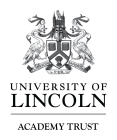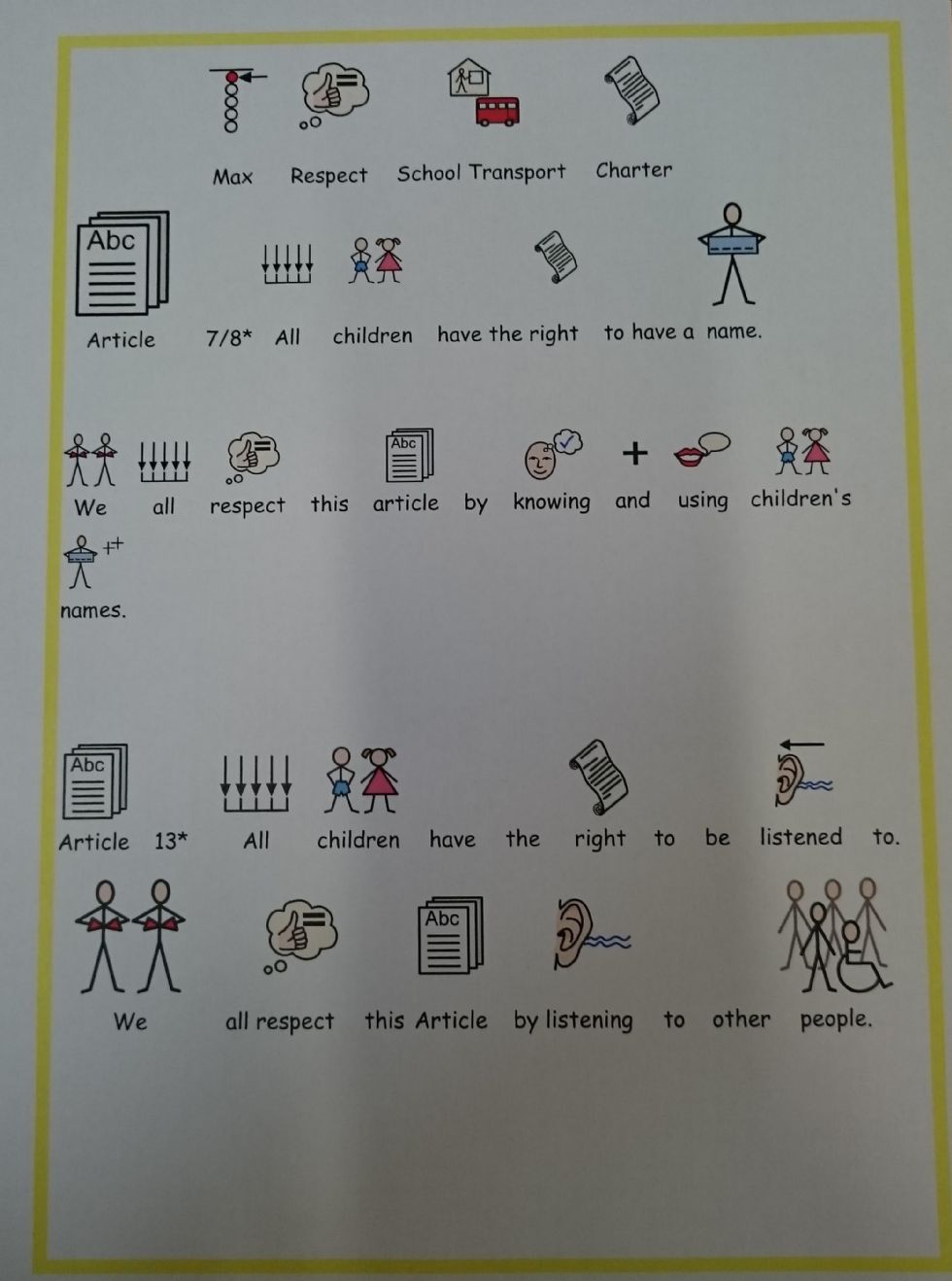GHA is a Unicef UK Gold: Rights Respecting School
Dining Hall Charter
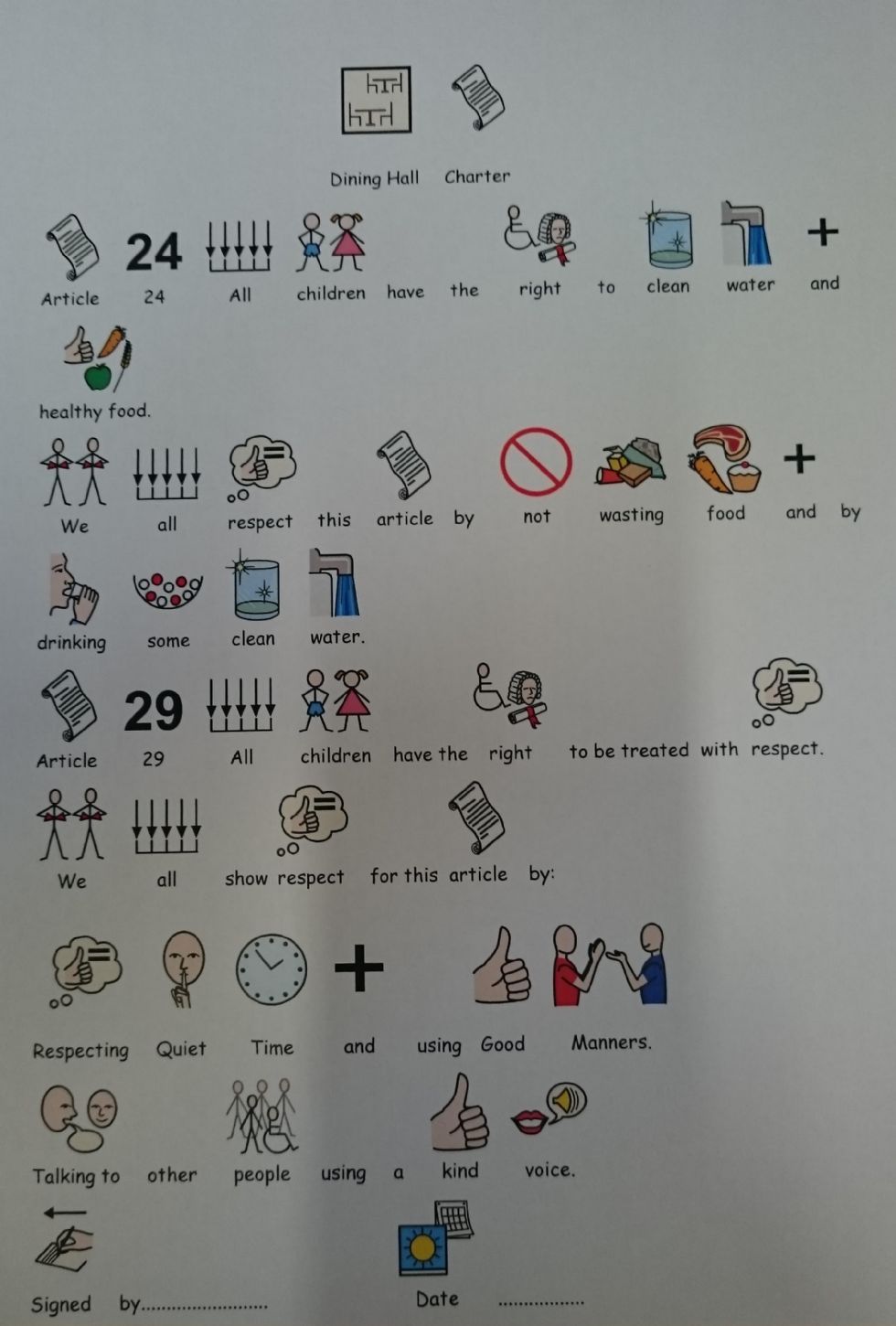
School Transport Charter
RRSA CHARTER
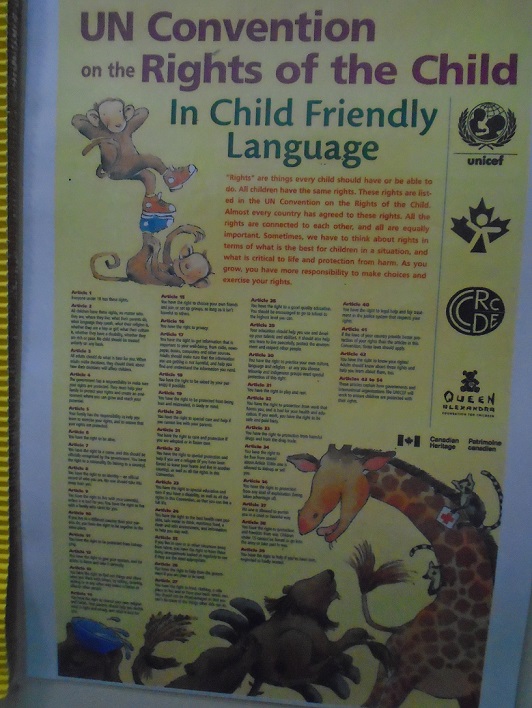
A RIGHT TO EDUCATION
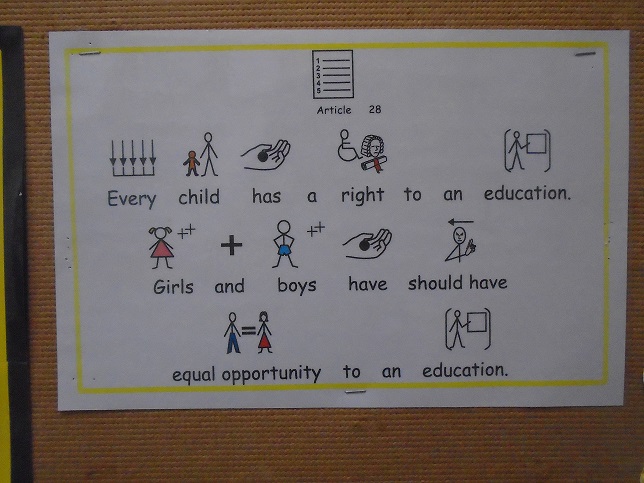
RIGHTS RESPECTING ARTICLE
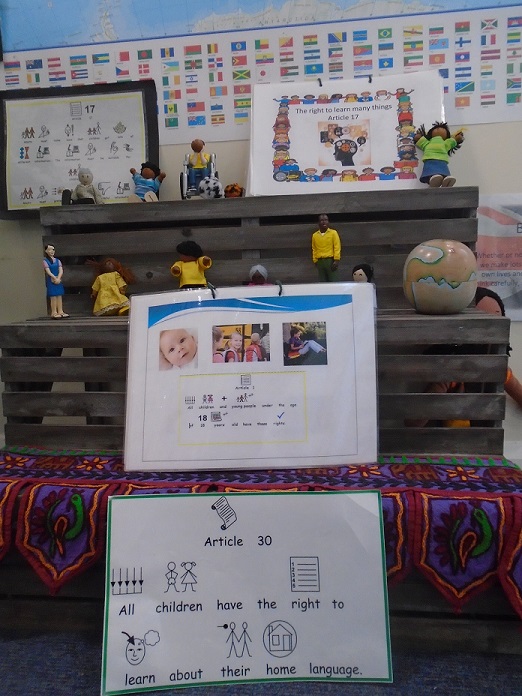
RRSA Reaccreditation Report : Gold Rights Respecting
School: Gosberton House Academy Headteacher: Louise Stanton RRSA coordinator: Louise Stanton Local authority: Lincolnshire Assessor(s): Martin Russell Date: 19th June 2019
1. INTRODUCTION
The assessor would like to thank the children, the Senior Leadership Team, staff and governors for their warm welcome to the school, for the opportunity to speak with adults and children during the assessment and for the detailed evidence provided to support the process. Prior to the assessment visit, the school completed a comprehensive School Evaluation: Gold form.
This was a reaccreditation visit. It was evident that children’s rights are embedded across the school and underpin every facet of school life.
Particular strengths of the school include:
• The wholehearted commitment to pupil centred learning, expressly linked to the UN Convention on the Rights of the Child.
• The children’s knowledge and understanding of their rights and their ability to discuss both personal, local and international issues in relation to the Convention.
• The school culture seeks to constantly affirm the autonomy and agency of the children which empowers them to be confident learners and active citizens.
Outcomes for Strands A, B and C have all been achieved.
2. MAINTAINING GOLD: RIGHTS RESPECTING STATUS
Our experience has shown that there are actions that have proven useful in other RRSA schools and settings in helping them to maintain and build on their practice at Gold level. Here are our recommendations for your school:
• Build in a more systematic approach to refresh everyone’s knowledge of the CRC and awareness of the latest RRSA guidance. This could include use of the ABCDE of Rights , making core vocabulary (including dignity, equity, global citizenship, duty bearers) more explicit, and revisiting the RRSA Charter Guidance.
• Explore ways of further developing the parents’ and carers’ knowledge and understanding of the CRC and their role in supporting their children to access all their rights.
• Further build on the school’s action for the rights of others by developing more explicit campaigning opportunities for the children. Consider engagement with Unicef UK’s OutRight, share good practice with other Gold schools locally and explore the Global Goals (Sustainable Development Goals) including using resources from the World’s Largest Lesson.
• Build on existing practice to find more opportunities to explicitly promote the CRC and RRSA to the wider community and other local schools.
3. ACCREDITATION INFORMATION
School context This is a specialist primary provision mainly for children with Autistic Spectrum Disorder. There are 95 children on role, over four fifths of whom are boys. Most pupils are from White British backgrounds and around 5% speak English as an additional language. Approximately half the children receive support through the Pupil Premium. The short inspection by Ofsted in May 2019 rated the school as Outstanding. Attendees at SLT meeting Principal (RRSA Lead) & Vice Principal Number of children and young people interviewed 10 children in focus groups, 2 children on the learning walk and various pupils spoken with during the tour. Number of adults interviewed 2 teaching staff, 3 support staff, 1 governor Evidence provided Learning walk, focus groups, written evidence including parental comments, class visits. Registered for RRSA: March 2012 Gold first achieved: February 2016
STRAND A: TEACHING AND LEARNING ABOUT RIGHTS
The United Nations Convention on the Rights of the Child (CRC) is made known to children, young people and adults, who use this shared understanding to work for improved child wellbeing, school improvement, global justice and sustainable development.
Strand A has been achieved
Most children are confident in their knowledge of a wide range of articles, understanding that rights are theirs from birth, that they should be able to access all their rights and that “Nobody should be allowed to take your rights away.” Expressing their understanding of the universal nature of rights, they spoke about situations in which some children's rights are not always met, “It isn’t exactly happening all the time and that isn’t a good thing.” The discussion continued, with reference to current conflicts, poverty, “In some countries children have to work.” and natural disasters. Although not familiar with the term ‘duty bearer’ the pupils had a very clear understanding that the adults in their lives, especially staff at school, are responsible for ensuring that they are able to access their rights.
The children learn about the CRC through assemblies, displays and a range of curriculum related content. Lesson planning refers to relevant articles as appropriate, for example, a Fairtrade topic made the connection between the choices we make as consumers and the ability of small-scale farmers to afford health care, education and a decent standard of living for their families. Staff explained that rights occur across the curriculum and that their awareness of the Convention is regularly refreshed and updated through staff meetings.
Parents and Governors see regular reference to articles and to the school’s rights respecting ethos in communications via the website and newsletters. Policies and other strategic documentation also refer to RRSA or particular rights. Parents also have access to the Tapestry online system which keeps them in touch with all aspects of their child’s learning. Special off timetable days and events are frequently linked to particular rights, Earth Day for example, and the learning and outcomes of such occasions is shared with parents. Staff commented that the knowledge of rights has given them a lens through which their pupils can be better understood, “If we don’t understand where our children are coming from, it’s very difficult to support them in moving forward.”
The Principal sees the CRC as fundamental to the vision and values upon which the school is based. She explained that “The Convention on the Rights of the Child is the framework within which every aspect of our ethos, our aims, our environment and our curriculum is underpinned.” The school’s holistic approach is recognised in many external accreditations including the Basic Skills Quality Mark, International Schools Award and National Autistic Society commendation. Their vision is one of enabling the children “to have a meaningful and purposeful life, not just now, but beyond school. We want them to see themselves as global citizens, part of a much broader world.” It was explained by staff that the Convention is seen as the structure for all this to be achieved and as a “Code for life” for the children themselves.
STRAND B: TEACHING AND LEARNING THROUGH RIGHTS – ETHOS AND RELATIONSHIPS
Actions and decisions affecting children are rooted in, reviewed and resolved through rights. Children, young people and adults collaborate to develop and maintain a school community based on equality, dignity, respect, non-discrimination and participation; this includes learning and teaching in a way that respects the rights of both educators and learners and promotes wellbeing.Strand B has been achieved.
All the children spoken with were able to explain a variety of different ways in which their school enables them to access their rights. Among many spoken of, they mentioned having a clean environment, play, a good education, access to safe water, nutritious food and their voice being heard. They spoke about how the members of staff in different roles across the school made sure that they could access their rights. The children were adamant that should there be a situation of somebody feeling that they were not getting their rights, they could certainly speak with an adult and the situation would be rectified. They explained that speaking to a trusted adult can be important if there is something wrong. There was a strong sense among the pupils that life in school was fair and they explained, for example, that “Some children learn better in a different way like standing up.” They also understood, however, that at times it is appropriate to treat people differently, “Sometimes you might need more help with writing than another person.”
Mutually respectful relationships were evident throughout the school during the visit and are seen by all adults as fundamental to the school’s ethos and the success of the children. One of the parental comments made available said, “I love that every adult really knows my child and I am even more impressed by how many know us.” Respect for the dignity of each person is paramount and it is suggested that there would be a benefit in overtly referring to this so that the children become familiar with the concept. The principal explained that “Our culture is not about adult control in any sense; the focus must always be on mutual respect.” The children spoke confidently about how friendly their school is and how people get on very well with each other. They said that when arguments do happen, teachers will listen to them and “everyone gets to tell their side of it.” A staff member elaborated on this explaining that, “Restorative practice is established across the school.” The report of the recent Ofsted inspection included the following with regard to relationships, ‘They behave well, knowing their human rights and being encouraged to make the right choices.’
The children asserted that they feel very safe in school and they could readily list numerous systems and processes in place to ensure this. When asked about why children should know their rights, one of the answers was, “The rights are there to keep you safe.” During the tour we had an extended conversation about E-safety which the children confidently linked to several appropriate articles and showed their understanding with advice such as “Don’t give your personal information away.” Recognising the role that they play in their own safety, one of the children pointed out that when you are outside you “Don’t play too risky.” It was clear that the children understood the meaning of ‘bullying. In their view it happens only very rarely and when it does, all were content that it is effectively addressed.
Children explained how the school provided them with information and a range of activities to support their health and wellbeing. They learn about nutrition and were enthusiastic in explaining about their healthy snacks and lunchtime choices. All children have a food preparation or cooking lesson every week. One child emphasised the importance of a “…balanced diet, because too many sweets are bad for you!” Forest School, PE and a wide range of sports clubs ensure that the children enjoy and value physical activity and being outdoors; “Exercise is important, we do ‘Activate’ twice a day.” Emotional health is a key part of the curriculum and the children are equipped with a range of strategies to recognise and respond to their feelings; as one adult explained “Self-regulation is key to the children’s development.” Pupils spoke with ease about different strategies such as “You can go and get a ‘calmer’” and “We have the relax room… teachers might send you or you can take yourself if you need it.”
A strong culture of inclusion is long established at Gosberton House. In order to support and engage everyone at the start of the day, the children, many of whom travel a long distance to school, begin each morning with a choice from a range of activities including free play, basic skills,breakfast club and circuits. One of the adults commented, “The children understand why we do all the things we do at school; they understand it as their right, and they value it.” A priority for the school is to enable and empower the children to become more active in their life outside school; this begins in their homes. One of the parental comments was, “This school has not only changed my son’s life but ours as a family too.” The curriculum, including numerous trips and visits, ensures that the children learn about and come to respect a range of different religions and cultures.
Most children who were interviewed indicated their commitment to supporting the right of others and themselves to learn. One of the pupils explained that “We have a rights charter in every class, we sign this to show that we will agree with these rights and respect them.” Others added to this explaining that there are times when people remind each other about the rights on their charter. A member of staff pointed out that “If something goes wrong in the classroom, children are quite likely to say ‘I have the right to an education’…. the charters really prompt the children.” The children also explained how, at the start of a new topic they discuss what they would like to learn about the subjects and their teachers make sure that these things are included in the learning. One of the pupils explained their growth mindset strategies saying, “It’s about how you are using your brain and thinking. You try to help yourself.”
STRAND C: TEACHING AND LEARNING FOR RIGHTS – PARTICIPATION, EMPOWERMENT AND ACTION
Children are empowered to enjoy and exercise their rights and to promote the rights of others locally and globally. Duty bearers are accountable for ensuring that children experience their rights.
Strand C has been achieved.
Pupil voice is valued and taken seriously across the school and at all levels of leadership. As one adult explained, “In terms of their education and their lives, we want them to be the ‘contributors to’ rather than just the ‘receivers of’.” The RRSA emphasis on pupil participation is seen as contributing significantly to this outlook. The voice of the children is built into the school’s curriculum review and planning systems with each subject leader consulting the children to inform developments. The children take on a range of different leadership roles and there are various teams including an elected school council which helps to inform the school’s leadership. The member of staff who works with the council said that “There is often specific discussion about rights linked to what the children are discussing.” One pupil said, “I like that we get lots of different choices about the clubs we can go to. We can organise them. I am going to be starting a basketball club soon.” The children have suggested and requested a range of additional play equipment, this has included the addition of a tent on the KS1 playground and more swings for KS2.
The whole school has been involved in taking action for the rights of others locally and globally. The children explained how their Macmillan coffee morning helped to raise money so that people ill with cancer can be supported, “Y6 had menus and we could order cakes and drinks.” Other charity efforts look further afield, “We raise money for poorer countries.” Most recently, the school participated in the Playground Challenge to support Unicef’s Soccer Aid. As a result of their work towards the Eco Green Flag award, the children have begun to experience campaigning through projects they have undertaken on pollution and the impact of plastics. They also participated in the Jazzy Socks event to raise awareness of Downs Syndrome. Staff felt that children now had “a deeper understanding about children across the world where some do not have their rights met and that this helps them to appreciate that their own rights are met.”
Gold: Rights Respecting report
Rights Respecting Schools Award © Unicef UK 2019 unicef.org.uk/rights-respecting-schools
Useful Links to learn more about Rights Respecting:
A Child's Introduction To The United Nations Convention On The Rights Of The Child
http://resourcecentre.savethechildren.se/sites/default/files/documents/coloring_book-1.pdf
UNICEF Child Friendly Summary on the Convention On The Rights Of The Child
http://www.unicef.org.uk/Documents/Publications/Child_friendly_CRC_summary_final.pdf
UNICEF Rights Respecting School Award Information
http://http://www.unicef.org.uk/rights-respecting-schools/about-the-award/about-unicef/
